|
February 18, 2017 - No. 5
Our Security
Lies in Our Fight to Defend the Rights of All
A Summit of
Imperialist Outlooks
•
Reject the Annexation of Canada to
the U.S.!
Reject Integration in the Name of Prosperity and Security!
No to Fortress North America!
• Need for Unity in Action of Working People of
Canada, Mexico and U.S.
Trudeau's Meeting with
Trump
• Canada-U.S. Agreements to Deepen
Integration
into Fortress North America
• Letters to the Editor
Canada's Predatory
Relations with Mexico
• Minister of Natural Resources
Leads Trade Delegation
- Margaret Villamizar -
• Mass Protests Against
Mexican Government's
Neo-Liberal Energy Reform
- Claude Brunelle -
• Chronicle of a Privatization by
Stealth
- Crismar Lujano -
Coming Events
• Canadian Council for the Americas
to Hold Conference in Toronto
- Louis Lang -
In Memoriam
David Stuart Mackay
With profound sorrow the Communist Party of Canada
(Marxist-Leninist) informs you that our Comrade David Mackay, a
militant life-long advocate and fighter for the rights of workers and
the dispossessed as well as the people of his beloved Scotland, left us
suddenly on February 15, 2017 as a result of an unexpected heart attack
from which he did not recover. David's passing comes after a long
struggle with AIDS, a challenge he faced with dignity and resilience.
We express our deepest sympathies to David's family and his many, many
friends.
David grew up in Vancouver where his parents were
political
activists. From his youth, David played an active role against
U.S. imperialism and in support of the Vietnamese, Cuban,
Palestinian and other peoples fighting for their liberation. He
participated in the 1968 student occupation at Simon Fraser
University demanding credential recognition for college students.
Of the 114 arrested, David was the only one to spend time in
jail. The judge sentenced him to six months for violating a peace
bond from an earlier protest. The judge remarked with the typical
contempt of the ruling elite for youth fighting for the new,
"Some people learn the hard way."
David worked for many years at the post office, where
he was
active in his union and upheld the workers' interests. In his
later years he worked as an English language teacher.
In the 1990s he actively participated in the discussion
forums organized by CPC(M-L) and stood as a candidate for the
Marxist-Leninist Party of Canada in the federal elections of 2004,
2008, 2011 and 2015. He also travelled to Scotland where he contributed
to the movement for Scottish sovereignty and independence, a cause he
upheld throughout his adult life.
To his dying breath, he maintained his resistance to
the
agenda of the big developers in Vancouver, who through their greed
are destroying the city making it uninhabitable for most of the
working class. He joined with others to oppose the wanton
destruction of historic sites throughout the city and especially
in the working class neighbourhood where he was raised. He
brought a legal challenge to one such development this year
uniting with others to form the Residents for Community Control
on City Development.
Working class history remained dear to David's heart
throughout his life. He was a great archivist and kept meticulous
records of the achievements of the working class movement over
the past 350 years.
At the meeting organized by CPC(M-L) in Vancouver last
May to
celebrate the anniversary of the Victory over Nazi-Fascism in the
Second World War, he spoke passionately about proletarian
internationalism and his family's involvement in the anti-fascist
struggle.
David leaves this world as an uncompromising militant
of the
working class. David did not suffer fools gladly and believed
that the worst were those who forgot the theme of the
immortal Internationale:
"We have been naught, we
shall be all.
'Tis the final
conflict, let each stand in their place.
The Internationale
shall be the human race."
A memorial event to commemorate David's life and
contributions to humanity will be held at a later date.

Our Security Lies in Our Fight to Defend
the
Rights of All
A Summit of Imperialist Outlooks
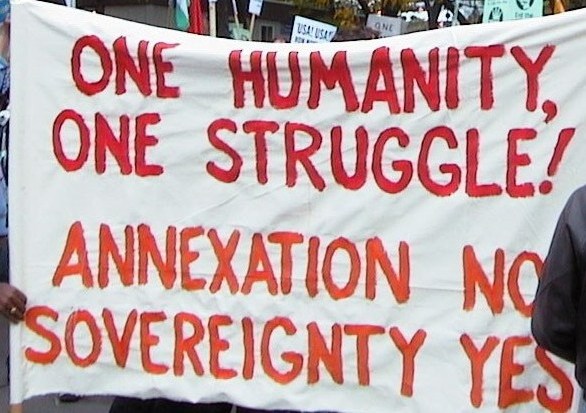
Trump greets Trudeau with an
indifferent shrug
What was the purpose of Prime Minister Trudeau going to
Washington to meet President Trump? It would seem from all
reports that nothing was accomplished on February 13, at least
publicly. Trump is facing unprecedented problems in asserting
what he sees as his god-given right to issue decrees and use his
police powers without the fig-leaf of the U.S. Constitution as an
impediment, while others want that fig-leaf to remain in place.
He appeared detached and distracted by such affairs and barely
engaged with Trudeau.
In this regard, the day in question saw intensification
of
the festering U.S. civil war between competing factions of the
financial oligarchy. Certain members of the U.S. spy agencies and
other government departments released classified information
accusing Trump's national security advisor Michael Flynn of
breaking the law. Flynn later in the day resigned his position
prompting Trump to unleash his spite against the "intelligence
community." "The real scandal here is that classified information
is illegally given out by 'intelligence' like candy," Trump
tweeted.
At the joint news conference, Trudeau stood placidly
irrelevant while Trump hurled racist epithets at Mexicans and
accused them of foul deeds. As if to punctuate the insignificance
of Trudeau to the U.S. political elite, the following day,
Trump's press secretary Sean Spicer referred to the Prime
Minister as Joe Trudeau.
What became of the incessant repetition of false
ideological
beliefs that preceded the summit? The mass media, at least in
Canada, were full of calls for Trudeau to "stand up" to Trump,
"fight for Canadian jobs" and insist Trump not make Canadians
targets of his wild executive orders or trade policies. Others
said no, no, the issue is for Trudeau to find common ground and
appease Trump under the notion that this will be more effective
at accomplishing the goal of jobs and trade. This is the counsel
Trudeau seems to have followed.
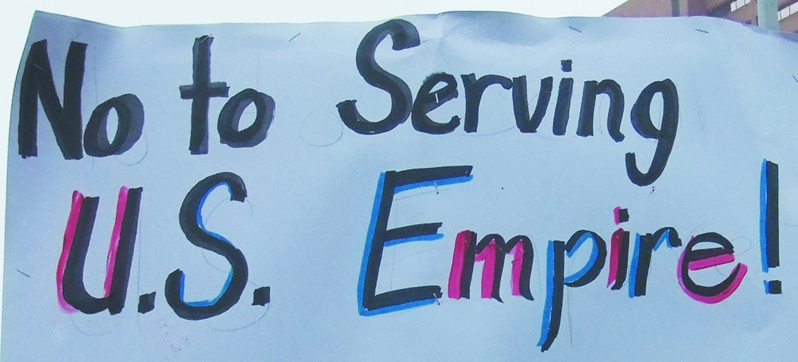 Missing from the mass media
was any political discussion that
should be front and centre such as what Canada has to do to
affirm its sovereignty in the face of U.S. imperialism's drive
for world hegemony and the increasing danger of war. The
oligarchs in control of the economy have made it clear that they
want Canada to be a captive source of natural resources for U.S.
imperialism. Is this the direction that will bring prosperity and
security to Canadians? The imposition of false ideological
beliefs diverts people from investigating and discussing what
kind of economy does Canada need when faced with a trading
partner in the U.S. that is so domineering and unreliable. What
new direction for the economy is necessary to make it secure and
able to stand on its own without having to rely on exports of
natural resources as it does today, which makes it vulnerable to
every crisis the U.S. imperialists create? Missing from the mass media
was any political discussion that
should be front and centre such as what Canada has to do to
affirm its sovereignty in the face of U.S. imperialism's drive
for world hegemony and the increasing danger of war. The
oligarchs in control of the economy have made it clear that they
want Canada to be a captive source of natural resources for U.S.
imperialism. Is this the direction that will bring prosperity and
security to Canadians? The imposition of false ideological
beliefs diverts people from investigating and discussing what
kind of economy does Canada need when faced with a trading
partner in the U.S. that is so domineering and unreliable. What
new direction for the economy is necessary to make it secure and
able to stand on its own without having to rely on exports of
natural resources as it does today, which makes it vulnerable to
every crisis the U.S. imperialists create?
The promotion of false ideological beliefs deprives the
people of a modern outlook capable of analyzing the world as it
presents itself and not a concocted reality of the ruling
imperialist elite. It suppresses broad discussion on the crucial
issues of war and peace in the twenty-first century and the
mobilization needed to engage Canadians in the struggle for an
anti-war government and to make Canada a zone for peace. All the
competing factions of the U.S. financial oligarchy including
Trump and Clinton want even greater preparations and engagement
in predatory and inter-imperialist wars.
The Canadian mass media coverage of the Trudeau/Trump
summit
mostly expressed relief that nothing happened and Trump did not
go off on a tirade at least against Canadians. Trump pledged only
to "tweak" NAFTA as if that should give solace to Canadians who
have seen the global oligopolies intensify their hold of Canada's
economy under these free trade agreements that serve the narrow
private interests of the most powerful oligarchs. Canada's role
in the U.S.-led NORAD and NATO military alliances would continue.
Trump did not raise, at least publicly, his and Clinton's usual
insistence that all members of NATO should contribute two per cent
of their GDP to military spending and NATO. This increased
militarization would require Canada to double its military
expenditures to over $40 billion annually as part of NATO's war
preparations and active missions such as the massive buildup of
troops and military equipment right up to Russia's western land
and sea borders.
No discussion took place in the media as to why NATO
and
NORAD should continue to exist and the dangers these military
alliances pose to Canada's sovereignty. Nor did the media raise
that the war preparations and active involvement in predatory
wars are in direct contradiction with the necessity and desire of
many Canadians to make Canada a zone for peace with an anti-war
government doing everything possible to avoid a catastrophic
world war and stop the constant U.S. campaigns of interference in
the sovereign affairs of the peoples and nations of the
world.
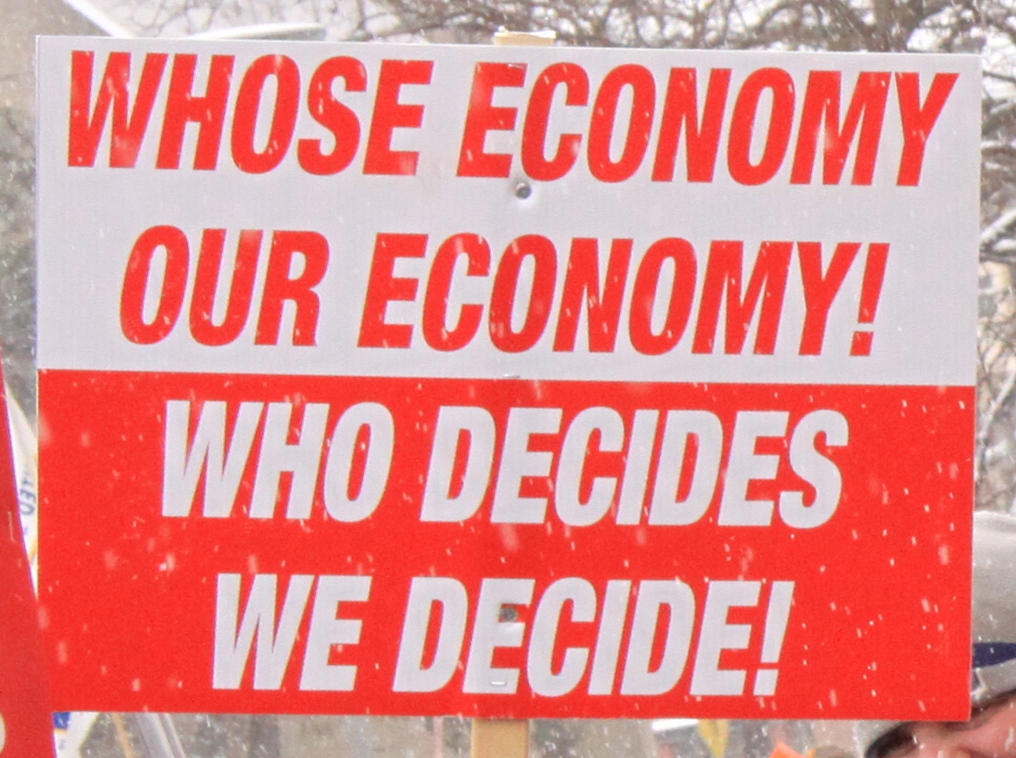 The outlook of the
financial oligarchy dominates the brains
of the two leaders, Trump and Trudeau. Such an outlook has within
it the tendency for war and brutal competition for domination
both within a country and abroad. The imperialist outlook stands
opposed to democratic renewal and the empowerment of the people
to control their economy, politics and lives. The imperialist
outlook opposes it as an affront to class privilege and denial of
the divine right to rule of those possessing great social wealth.
The imperialist outlook denies the modern definition that rights
belong to people by virtue of being human and that Canada has
sovereign rights as a modern nation with a responsibility to
oppose U.S. imperialism's drive for world hegemony. The outlook of the
financial oligarchy dominates the brains
of the two leaders, Trump and Trudeau. Such an outlook has within
it the tendency for war and brutal competition for domination
both within a country and abroad. The imperialist outlook stands
opposed to democratic renewal and the empowerment of the people
to control their economy, politics and lives. The imperialist
outlook opposes it as an affront to class privilege and denial of
the divine right to rule of those possessing great social wealth.
The imperialist outlook denies the modern definition that rights
belong to people by virtue of being human and that Canada has
sovereign rights as a modern nation with a responsibility to
oppose U.S. imperialism's drive for world hegemony.
False ideological beliefs obscure how problems pose
themselves from the point of view of the working people and their
modern outlook, deliberations and actions with analysis to find a
way forward that defends their rights and the rights of all.
As TML Weekly wrote ahead of the summit, "The
promotion of false ideological beliefs diverts attention from the
fact that what Trudeau is negotiating is the place of the
oligopolies in the New Order Trump says he is bringing into
being."
After the summit in Washington, Trudeau flew off to
Europe to
promote the private interests of the oligopolies for a free trade
deal with the European Union (CETA). Many Canadians oppose CETA
as yet one more weapon of the oligopolies to trample on the
rights of working people and the sovereignty of Canada.
Working people want control over their work, lives and
future. They want modern definitions enshrined in a modern
constitution and nation-building project to guarantee their
rights and well-being free from the overbearing domination of the
financial oligarchy and the class privilege of the rich.

Reject the Annexation of Canada to the U.S.!
Reject
Integration in the Name of
Prosperity and Security!
No to Fortress North America!
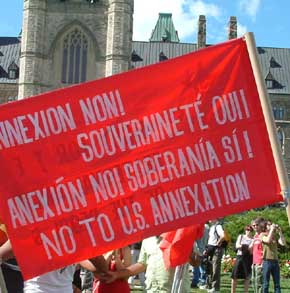  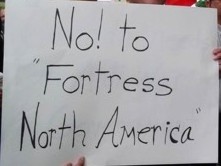
In the name of prosperity and security, reams of hype
have accompanied the meeting between Prime Minister Justin Trudeau and
U.S. President Donald Trump, which took place at the White House in
Washington, DC on February 13. Other meetings took place at the same
time between Canada's Ministers of Foreign Affairs, Defence, Public
Safety, and Finance and their U.S. counterparts to hash out deals, the
details of which are for the most part unknown. Backroom meetings have
also carried on between rich boys such as former Prime Minister Brian
Mulroney, who negotiated the original NAFTA sell-out, and Wilbur Ross,
who is infamous for overseeing schemes to flip factories and in the
process liquidate workers' pensions and livelihoods.
On the whole, high praise
is given to any effort to
keep
Canada's relations with the U.S. on an even keel.[1] This constant refrain is
directed towards imbuing the polity with the false ideological belief
that NAFTA has been a great boon to Canada's economy. It is as if the
economy is not in crisis, as if the natural resources of Canada have
not been reduced to "rip and ship" in the case of oil and the export of
raw logs in the case of forestry. Meanwhile, one of the world's most
successful supply management monopolies, the Canadian Wheat Board,
controlled by the farmers themselves has been dismantled. Dairy and
other supply management boards are also being dismantled to bring
Canada's food supply under the control of the biggest private
interests. Health care, education and public services are being
privatized at a faster and faster pace. What is referred to as economic
recovery is jobless and workers are losing their pensions, benefits and
security across the board while the rich are becoming a lot richer and
the poor a lot poorer. Legislatures and courts are dictating the terms
on all fronts and resistance is criminalized.
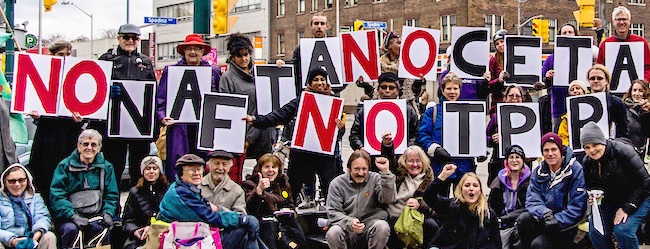
Picket at then-Minister of International Trade Chrystia Freeland's
office in Toronto,
November 26, 2016. (A. Yang)
There is no discussion of the actual results of NAFTA
for the
working people. When no facts are presented, it is not possible
to dispute the false ideological belief that NAFTA is great, that
the annexation of Canada into Fortress North America and the
integration of Canada, the U.S. and Mexico into a new United
States of North American Oligopolies are all great. Those who
fight this direction are considered traitors deserving of
expulsion if foreign born or incarceration if not.
The fundamental message the rulers are sending is that
there
should be no confusion as to who has the right to deliberate on
all the matters of concern to the people, and it is not the
people. This is what has to change.
Note
1. In their coverage of the
meetings between Canadian and U.S. officials in Washington on
February 13, the monopoly media, its pundits and think-tank
spokespersons try to disorient the peoples of Canada and the U.S.
in such a way that their interests appear bound up with those of
the financial oligarchy of those countries. They declare that
"common ground" has been established between the two
administrations and this is "win-win" for Canada and the U.S.
Examples of this diversion include:
- Carlo Dade, director of the Centre for Trade and
Investment
Policy at the Canada West Foundation as quoted by Reuters:
"I thought it was a huge, huge win. The worst case
scenario
is we wound up with an Australia moment, when a relationship that
should be on solid ground takes a bad turn. Instead, we actually
got an endorsement of North American jobs, of Canada-U.S. jobs,
working together, no 'America First' -- just the opposite."
- David Wilkins, former U.S. ambassador to Canada,
quoted
by
Reuters:
"The president's comment on the economy and creating
jobs
together was a very positive sign for Canadians, especially those
that had been concerned about the trading relationship. [...] I think
it was a win-win for both countries."
- Walid Hejazi, associate professor of the Rotman
School
of
Management at the University of Toronto, speaking to CBC
News:
"Donald Trump and his administration don't see Canada
as the
problem they seek to fix. ... Trade between the U.S.
and Canada is not zero-sum -- it's actually win-win."
- Tasha Kheiriddin, iPolitics columnist:
"The meeting went better than expected. There was no
friction
-- not in public, at any rate. The two men even found common
ground on unlikely terrain: advancing women in the workplace.
Overall, the visit -- the most challenging meeting of his
political career to date -- turned out to be a job well done by
Trudeau. It might not lead to a beautiful friendship, but it's
not love Trudeau's looking for: it's respect. And on that
measure, he appears to be off to a good start."
Margaret Wente, Globe and Mail columnist:
"Mr. Trump did not hang up on us the way he did on the
Australians. He didn't stomp all over us the way he did with
Mexico. For the time being, we seem to have persuaded him that
we're his harmless little buddy. Our guys can get back to Ottawa
and pour themselves a nice stiff drink. The PMO's idea of
creating a positive event featuring leading female business
executives was, frankly, a stroke of genius. The event was a
manufactured feel-good piece of non-news that everyone, even the
media, could solemnly applaud as they tried to fill up air time.
It gave Mr. Trudeau a chance to burnish his feminist credentials,
while giving Mr. Trump a chance to mend his reputation as an
unredeemed sexist pig. The businesswomen's summit also gave the
two men an excuse to find common ground..."

Need for Unity in Action of Working People of
Canada,
Mexico
and U.S.
The Trump administration's reactionary and jingoistic
policy and rhetoric against the sovereign country of Mexico is an
indicator of the harmful character of the trade agenda of the forces
pushing for the new United States of the North American Oligopolies.
The Trudeau government shamelessly supports the private interests that
want to fleece Mexico even more than is the case now and remains silent
about U.S. attacks on Mexico. Trudeau's silence on this matter is even
being turned into a virtue. One of the merits ascribed to Prime
Minister Trudeau's visit to Washington, DC on February 13 was to
convince Trump that, unlike Mexico, trade with Canada benefits the U.S.
Spokespersons of the ruling elite in Canada declared a victory when
Trump, at the joint press conference with Trudeau, said that the U.S.
trade relationship with Canada is "a much less severe situation than
what's taking place on the southern border."
In the midst of Canada
throwing Mexico under the bus in
its
relations with the U.S., it is also facilitating the entry of
North American monopolies into Mexico's newly-privatized energy
sector. In the days leading up to Trudeau's meeting with Trump,
Canada sought to benefit from the destabilization of Mexico-U.S.
relations by sending a high-level trade delegation of energy and
mining monopolies to Mexico. At the same time, media report that
Canada will revisit the terms of NAFTA on a bilateral basis with
the U.S. and cravenly hopes to avoid being "caught at the
negotiating table when the Americans go after Mexico."[1]
TML Weekly
calls on Canadians to oppose attempts to
split the
unity of the working people of Canada, Mexico and the U.S.
Canadian workers are falsely told that they have benefitted under
NAFTA and should defend it, but should not worry about the Trump
administration because the worst attacks will be levelled against
Mexico. Canada feeds the U.S. imperialist disinformation which
claims that workers in the U.S. will be favoured by Trump's
destructive and aggressive measures against Mexico and that U.S.
and Canadian workers will be favoured if NAFTA is reorganized to
favour business interests even more. The proof of the pudding of
what NAFTA stands for is well known and it is not good for the
working class and people of any of the three countries.
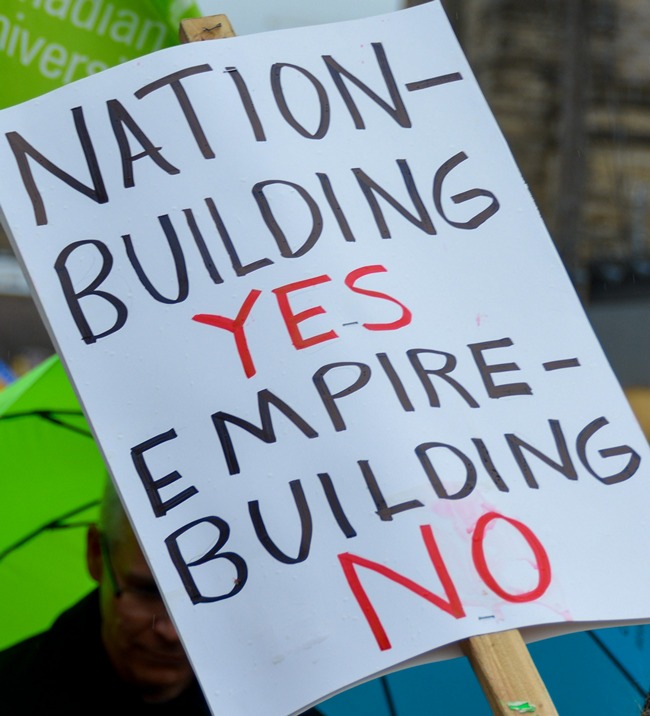 The workers of Canada,
Mexico and the U.S. are together
the
targets of all the attacks of the Trump administration and of the
oligopolies which consider all three countries as territory for
building their empires. Through arrangements such as NAFTA they
have given themselves free rein to force the workers into
competition on a continent-wide scale to bring down wages and
working conditions for all, and to close and reopen factories
according to what will serve their empire-building. The workers of Canada,
Mexico and the U.S. are together
the
targets of all the attacks of the Trump administration and of the
oligopolies which consider all three countries as territory for
building their empires. Through arrangements such as NAFTA they
have given themselves free rein to force the workers into
competition on a continent-wide scale to bring down wages and
working conditions for all, and to close and reopen factories
according to what will serve their empire-building.
Trump as a representative of U.S. imperialism now calls
for changing the terms of NAFTA to strengthen U.S. hegemony within this
arrangement and in particular the U.S. domination over various sectors
of the economy and the ability to use them for war production. In
Canada this means ensuring control over strategic natural resources,
especially energy, removing remaining protections for domestic dairy
production that prohibit the market being flooded by U.S. products,
placing U.S. agents and equipment in factories and along transport
corridors inside Canada to "pre-clear" shipments and other measures.
For Mexico the U.S. demands that it continue to provide fresh produce
of all kinds and basic goods while it puts the squeeze on U.S.
oligopolies operating factories in Mexico to shift production to U.S.
territory or pay a steep tariff, which can be written off if they
invest in Trump's privatized infrastructure schemes.
Linked to this, the Trump administration is promoting
fierce
competition in the U.S. amongst the former slave states and
so-called right-to-work states to offer the biggest incentives to
the oligopolies which are free to close and reopen factories
wherever they will find the biggest pay-the-rich schemes and most
severe anti-worker laws. Meanwhile, meetings scheduled between
Trump and the President of Mexico for early February had to be
cancelled by the Mexican side after Trump issued an executive
order on January 25 to "secure the southern border of the United
States through the immediate construction of a physical wall on
the southern border."
There is an urgent need at this time for the working
people
of Canada, Mexico and the U.S. to express their unity in action
against the attempts to bring in such retrogressive arrangements
in North America to preserve the hegemony of the U.S. imperialist
North American oligopolies and implement the program to Make
America Great Again. The working class of Canada, Mexico and the
U.S. has a proud history of fighting for their rights and the
rights of all and refusing to be split by allowing others to be
targeted.
Note
1. "Canada, United States will
focus on bilateral NAFTA negotiations," Robert Fife, Globe
and Mail, February 15, 2017.

Trudeau's Meeting with Trump
Canada-U.S. Agreements to Deepen Integration
into
Fortress
North America
On February 13, Prime Minister Justin Trudeau visited
the
White House to hold official meetings with U.S. President Donald
Trump, accompanied by an entourage including his main advisers
Gerald Butts and Katie Telford as well as Minister of Foreign
Affairs Chrystia Freeland, Minister of Public Safety Ralph
Goodale, Minister of Finance William Morneau, Minister of
Transport Marc Garneau, and Minister of National Defence Harjit
Sajjan. Trudeau and Trump held two bilateral meetings and a press
conference and participated in a roundtable with women CEOs of
big mostly U.S. monopolies. Trudeau also met with Speaker of the
House of Representatives Paul Ryan and Senate Majority Leader
Mitch McConnell.
Trudeau and Trump issued a joint statement which
outlined the
character of bilateral relations between the two countries under
the Trump administration. The joint statement sets the tone for
the focus of the bilateral relations between the two executives
in the coming period.[1]
Contents of Joint Statement and Related
Matters
Trade
The joint statement issued by Trudeau and Trump reads:
"We affirm the importance of building on this existing
strong
foundation for trade and investment and further deepening our
relationship, with the common goal of strengthening the middle
class."
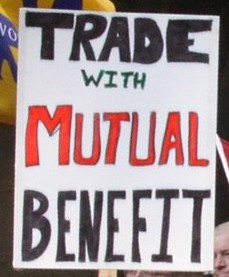 Media has focussed most
attention on the statement of
Trump
during the joint press conference that "We have a very
outstanding trade relationship with Canada. We'll be tweaking it.
We'll be doing certain things that are going to benefit both of
our countries. It's a much less severe situation than what's
taking place on the southern border. On the southern border, for
many, many years, the transaction was not fair to the United
States. It was an extremely unfair transaction. We're going to
work with Mexico, we're going to make it a fair deal for both
parties. I think that we're going to get along very well with
Mexico; they understand and we understand." Media has focussed most
attention on the statement of
Trump
during the joint press conference that "We have a very
outstanding trade relationship with Canada. We'll be tweaking it.
We'll be doing certain things that are going to benefit both of
our countries. It's a much less severe situation than what's
taking place on the southern border. On the southern border, for
many, many years, the transaction was not fair to the United
States. It was an extremely unfair transaction. We're going to
work with Mexico, we're going to make it a fair deal for both
parties. I think that we're going to get along very well with
Mexico; they understand and we understand."
Of all the aspects of the visit, this is presented by
media
as the major victory for Trudeau. Speculation is now taking place
over what the word "tweak" means. The fact that Mexico appears to
be the main target for Trump is met with glee by some
commentators and government officials quoted. Robert Fife,
writing in the Globe and Mail quotes a "high-level
Canadian official" as saying, "We think there are going to be
things that they will come to us and get them straightened out
and then the Americans can say to the Mexicans, 'We have this
negotiated with the Canadians, are you okay with this?' [...]
There are things that can only be solved by bilateral
negotiations. [...] We don't want to be part of the triumvirate
when the item is [Mexico] drugs coming into the United States,
illegal immigration or building a wall," the official said.
On the other side, Fife quotes trade lawyer John
Weekes, who
is said to have helped negotiate NAFTA. Weekes said, "a lot of
people think we would be better off if we can sit down and
negotiate bilaterally with the Americans, but I am not of that
view. The advantage of having someone else in the room,
especially if you are going to be the target, is that we won't
get as much attention as the Mexicans do and that's not a bad
thing."
Pushing the idea that Canadians should debate how
Canada's
financial oligarchy can come out on top of Mexico's is
beneath contempt and serves neither the people of Canada nor
Mexico.
Regulations and
Standards
The joint statement reaffirms the direction set under
previous Canadian and U.S. governments to use executive powers to
harmonize regulations and eliminate regulations that stand in the way
of the oligopolies. This particularly relates to aligning the standards
set by Canadian regulatory bodies with those of the U.S. standards as
default, especially manufacturing standards, measures for environmental
protection and emissions, labour standards and taxation.
It reads:
"We will continue our dialogue on regulatory issues and
pursue shared regulatory outcomes that are business-friendly,
reduce costs, and increase economic efficiency without
compromising health, safety, and environmental standards. We will
work together regarding labor mobility in various economic
sectors."
Infrastructure
Emphasis is placed on large infrastructure projects
through
which billions in public and private funding can be put towards
facilitating the movement of greater quantities of resources,
goods and people.
The statement reads:
"[W]e will encourage opportunities for companies in
both
countries to create jobs through those [infrastructure]
investments. In particular, we look forward to the expeditious
completion of the Gordie Howe International Bridge, which will
serve as a vital economic link between our two countries."
The Gordie Howe International Bridge is a $5 billion
project
to be built between Windsor, Ontario and Detroit, Michigan. The
project was negotiated under the Harper/Obama administrations and
will be privately built and managed with tolls on users. While
much ado is made about who will pay for the Trump
administration's proposed physical barrier along the border with
Mexico, the Gordie Howe bridge project is entirely financed by
the governments of Canada and Ontario, including the U.S. Customs
Plaza on the Detroit side. While the Canadian government is
paying, including in the name of "job creation," rules mandating
a "buy American" policy for construction on the U.S. side may be
enforced.
Energy
On the issue of energy, the joint statement says:
"We share the goals of energy security, a robust and
secure
energy grid, and a strong and resilient energy infrastructure
that contributes to energy efficiency in both countries."
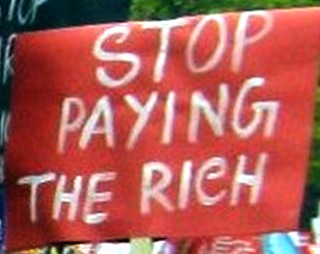 This relates to the ongoing
integration of the
electricity
and other energy grids on a North American basis to meet the
demands of the oligopolies. At present Canada does not have its
own electricity distribution grid, nor its own "grid" for moving
oil and gas for domestic processing and export. Instead,
electricity and other energy distribution is organized on a
north-south basis. On this basis, Canada's energy infrastructure
is considered part of the "critical infrastructure" of the U.S.
homeland and subject to its authority. This relates to the ongoing
integration of the
electricity
and other energy grids on a North American basis to meet the
demands of the oligopolies. At present Canada does not have its
own electricity distribution grid, nor its own "grid" for moving
oil and gas for domestic processing and export. Instead,
electricity and other energy distribution is organized on a
north-south basis. On this basis, Canada's energy infrastructure
is considered part of the "critical infrastructure" of the U.S.
homeland and subject to its authority.
The statement goes on to say:
"Given the integrated nature of the infrastructure that
supports our intertwined economies, cyberthreats to either
country can affect the other. We therefore commit to further
cooperation to enhance critical infrastructure security, cyber
incident management, public awareness, private sector engagement,
and capacity building initiatives."
Pre-Clearance and
Operation of U.S. Agents on Canadian
Soil
The Trudeau government has expressed concern over the
fate of "pre-clearance" arrangements it and its predecessor negotiated
with the Obama administration. The arrangements would have travellers
to
the U.S. from Canada via air, rail or water "pre-cleared" by U.S.
officials based on Canadian territory.
Bill C-23, currently before the House of Commons, would permit U.S.
border agents in Canada to arbitrarily question, search and even detain
Canadians who request to cross
the border, meaning U.S. law would be applied against Canadians
extraterritorially and Canadian law and sovereignty rendered null and
void.
The statement confirms that these arrangements will go
forward and be expanded:
"[W]e are building a 21st century border through
initiatives
such as pre-clearance of people and integrated cross-border law
enforcement operations. In addition, our two countries are
committed to a coordinated entry-exit information system so that
records of land and air entries into one country establish exit
records for the other."
The statement also confirms that a demand of the
oligopolies
to implement pre-clearance of cargo bound for the U.S. will be
implemented:
"Recognizing the success of pre-clearance operations
for travellers, we commit to establishing pre-clearance operations for
cargo [...] In the spirit of a more efficient and secure border,
we will also examine ways to further integrate our border
operations, including analysis of the feasibility of co-locating
border officials in common processing facilities."
The impression is given that these arrangements are
reciprocal, but to date no pre-clearance by Canadian officials in
the U.S. has been put in place. Further, the definition of
"common processing facility" is unclear. Will such facilities be
made the subject of security clearances for workers? How will
facilities be deemed common?
Elsewhere in the statement we are informed that Trudeau
and
Trump "have agreed to work together to fight against the traffic
of opioids across our border."
Bill C-37, An Act to amend the Controlled Drugs and
Substances Act and to make related amendments to other Acts
contains provisions to permit Canadian Border Services Agency
officers and some employees of Canada Post to open letter mail
weighing less than 30 grams without a warrant.
Legislation adopted following September 11, 2001
previously
expanded agents' powers to open mail but not for packages
weighing less than 30 grams. These powers are now being expanded in the
name of stopping the illegal import of opioids, specifically fentanyl,
into Canada, allegedly from China.
U.S. Military Command
of Canada
According to the statement, the two administrations
will
"work to modernize and broaden our NORAD Partnership in these key
domains, as well as in cyber and space."
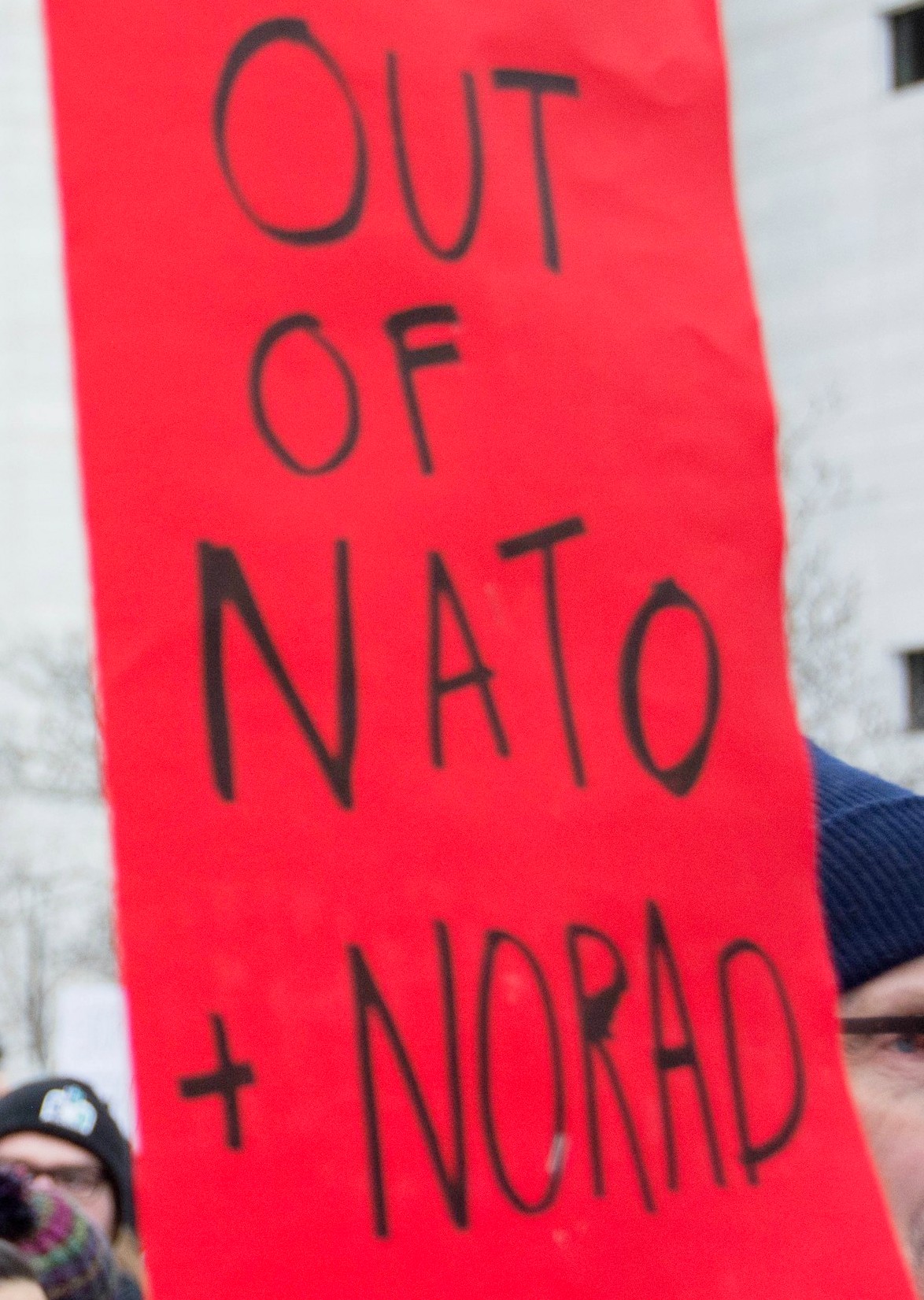 Despite the vagueness of the
statement, the direction
is for
Canada to come further under U.S. military command. It likely
includes the placement of new generations of U.S.-controlled
NORAD sensors on Canadian territory through which the movement of
people and goods can be monitored. It also relates to the plans
of Canada's ruling circles to present the placement of U.S.
missiles and sensors in Canada as part of the U.S. ballistic
missile defence program as necessary, including creating hysteria
around attacks against Canadian cities. Despite the vagueness of the
statement, the direction
is for
Canada to come further under U.S. military command. It likely
includes the placement of new generations of U.S.-controlled
NORAD sensors on Canadian territory through which the movement of
people and goods can be monitored. It also relates to the plans
of Canada's ruling circles to present the placement of U.S.
missiles and sensors in Canada as part of the U.S. ballistic
missile defence program as necessary, including creating hysteria
around attacks against Canadian cities.
The question of "cyber" in the context of NORAD refers
to,
among other things, the Joint Cyber Center (JCC) established by
U.S. Northern Command and NORAD in 2012. Cyberwarfare has become
a greater priority for the U.S. military and cyberattacks are
presented as a constant worry for the people and a new form of
warfare they are facing.
An example of how the "cyberattacks" issue is
being
used to promote the use of police powers, the Trudeau government
is now emphasizing the need for Canada's spy agencies to play a
greater role in elections to ensure "cybersecurity" for
political parties and their databases and computer systems. Since
officially repudiating its election promise to replace the
first-past-the-post system, increasing intelligence agency
involvement in elections has become the main electoral reform the
Trudeau government is advocating.
Speaking in the House of Commons on February 9,
Minister of
Democratic Institutions Karina Gould stated: "Our government will
also take steps to protect the integrity of Canada's democracy by
defending the Canadian electoral process from hacking and
cyberthreats. If the political parties' computer systems are
hacked or compromised, it could jeopardize our democratic system.
Political parties constitute vital democratic infrastructure. We
will ensure that Canada's democracy is better protected by
helping the parties protect their information. We will ask the
Communications Security Establishment to analyze the risk that
Canada's political parties' computer systems could be hacked and
to make the results of that analysis public. This plan will help
us better protect Canada's democracy by helping the political
parties protect themselves.
"As well, CSE will reach out to political parties to
share
best practices on how to guard against hacking," Gould said.
Parliamentary Secretary to the Minister Mark Holland
added,
"We know the issue of cybersecurity, particularly as we watched
it unfold in the U.S. election, was of incredible import.
Therefore the minister, in the new mandate letter, has been given
specific authority to tackle that issue and ensure that our
cybersecurity is in place to protect Canadian democracy and,
indeed, the affairs of all parties."
Canada's Role in U.S.
Aggressive Military Alliances
The joint statement says:
"The United States values Canada's military
contributions,
including in the Global Coalition to Counter-ISIS and in
Latvia."
 The U.S. also says it
"welcomes" Canada's decision to
buy 18 new
Super Hornet aircraft as an interim measure "until the permanent
replacement [for the CF-18] is ready." The U.S. also says it
"welcomes" Canada's decision to
buy 18 new
Super Hornet aircraft as an interim measure "until the permanent
replacement [for the CF-18] is ready."
During the week before Trudeau's visit, Canada's
Minister of
Defence Harjit Sajjan announced $404 million to upgrade Light
Armoured Vehicles (LAV) for use in "domestic and international"
operations.
According to a February 16 article in the Globe and
Mail, "Canada's defence budget reached 1 per cent of GDP [on
February 10], thanks to [the contract] for upgrades to LAV III"
vehicles.
Following the NATO Defence Ministers' Meeting on
February 16,
Minister of Defence Sajjan announced that Canada will look at
increasing military spending to meet the two per cent of GDP target
set by the U.S. "We knew that spending by the previous government
was low and the defence policy review allowed us to do a thorough
analysis of what was required. Yes, this will require defence
investments," Sajjan said.
"We in Canada need to be able to demonstrate a thorough
plan
and what type of defence investment is needed, because this is
significant money that needs to be invested, but the Canadian
taxpayer also requires us to make sure that we are efficient with
the money," he said.
All of this shows that far from affirming the anti-war
sentiments of Canadians, the Trudeau government has in the most
servile manner, put Canada at the disposal of aggressive war in
the Middle East and Africa and stepped up war preparations in
Europe and Asia.
Note
1. Since September 11, 2001, there
has been a concerted push from the U.S.
imperialists to put
in place new arrangements at every level. In Canada, this annexation
into a Fortress North
America is considered by the ruling elite to be a "non-partisan issue."
No matter which
political party was in power, various security and border arrangements
were implemented --
initially on a "temporary basis" under the Liberal government of Jean
Chrétien when it was
claimed that they were special arrangements with "sunset" clauses which
would permit them
to expire when the situation changed. These arrangements began to be
made permanent under
the government of Paul Martin in the name of guaranteeing "North
American prosperity."
Under the Conservative government of Stephen Harper and the
administration of George W.
Bush these arrangements were entrenched and expanded and now the
Liberal government of
Justin Trudeau is taking them further, first with the administration of
Barack Obama and now
that of Donald Trump.
Among the agreements worked out for these purposes are the "Smart
Border Declaration" (2001), the "Security and Prosperity Partnership"
(2005) and most recently the "Beyond the Border Agreement on Security
and Competitiveness" (2011). These and other agreements were negotiated
and implemented through the executive powers of Canada, the U.S. and
Mexico. They have placed Canadian territory, coastlines and airspace
under U.S. military command and placed U.S. security agents -- with the
go-ahead to exercise their powers -- on Canadian soil. These
arrangements place the natural and human resources of the countries of
North America under the direct control of the biggest oligopolies which
are making new state arrangements on the basis of integrating the
economies and armed forces of Canada, Mexico and the U.S. as
well
as
their
transportation, energy and security corridors.

Letters to the Editor
The meeting between Trudeau and Trump is being used by
the
Trudeau government to declare in the most slavish manner that
this government will continue on the path of serving up the
interests of the working class and the nation on a silver platter
to the interests of the oligopolies. Like father, like son, this
Prime Minister is a real prince of lackeys of U.S. imperialism.
His subservience is utterly shameless.
[Signed]
***
 Trudeau's reference to
Winston Churchill in his press
conference with Donald Trump on February 13 well reveals his
service to private interests and national sellout as well as
adherence to brutal ways to defend Anglo-American values and "way
of life." Trudeau's reference to
Winston Churchill in his press
conference with Donald Trump on February 13 well reveals his
service to private interests and national sellout as well as
adherence to brutal ways to defend Anglo-American values and "way
of life."
Of all people to quote, Trudeau chose Winston
Churchill. Why
Churchill? It was his "iron curtain" speech which was used to
unleash the Cold War in Fulton, Missouri on March 5, 1946.
Churchill called for a war against the USSR. He unleashed a
campaign of disinformation which attacked communism by claiming
the superiority of American values and way of life. Churchill
despised communism and, like both Trump and Trudeau are doing
today, he denied the crisis of capitalism by claiming that
everything had to be done to prove its superiority, that it would
make everyone happy and prosperous. Despite the misery capitalism
has engendered on the world scale, this is the best that Trudeau
and Trump can come up with to justify government of police
powers. It is pathetic.
[Signed]
***
Trudeau's quote from Winston Churchill is not a good
sign. He
quoted Winston Churchill saying, "That long Canadian frontier
from the Atlantic to the Pacific Oceans, guarded only by
neighborly respect and honorable obligations, is an example to
every country, and a pattern for the future of the world." He
concluded saying, "That, my friends, is the very essence of the
Canada-U.S. relationship."
In the name of uniting the "English-speaking peoples"
against
all others, Churchill's advocacy of brutal military rule and
concentration camps such as imposed in Greece and Ireland,
amongst other countries, to "defend democracy" has led the
peoples of the world to question that "democracy" which needs
such methods to defend it. For Trudeau to harken back to the days
of Churchill is not a good sign.
[Signed]
***
Trudeau meeting with Trump shows Canadians what they
think it
takes to be good neighbours and it is not in the interests of
either Canadians, Americans or anyone else.
"With a level of economic and social integration that
is
unmatched on the world stage, Canada and the United States will
forever be a model example of how to be good neighbors," Trudeau
said. However, this level of economic and social integration
Trudeau speaks about glowingly is a level of economic and social
integration that violates the rights of Canadians and creates
great insecurity and harm to the Canadian working people and to
Canada's sovereignty.
[Signed]
***
The joint statement issued by Trudeau and Trump makes
it
clear that all aspects of "securing the borders are being
expanded." These "commitments" will strengthen the police powers
being exercised with the most recent attacks on peoples of the
Muslim faith and countries targeted for regime change as well as
expanding the tracking of both Canadian and U.S. citizens,
allowing foreign officials to pre-clear cargo in Canada and so
on. The statement says, "We demonstrate daily that security and
efficiency go hand-in-hand, and we are building a 21st century
border through initiatives such as pre-clearance of people and
integrated cross-border law enforcement operations. In addition,
our two countries are committed to a coordinated entry-exit
information system so that records of land and air entries into
one country establish exit records for the other."
I find it incredible that the servile media are
promoting the
good job Trudeau did in defending Canada's interests when all the
facts point to the opposite.
[Signed]
***
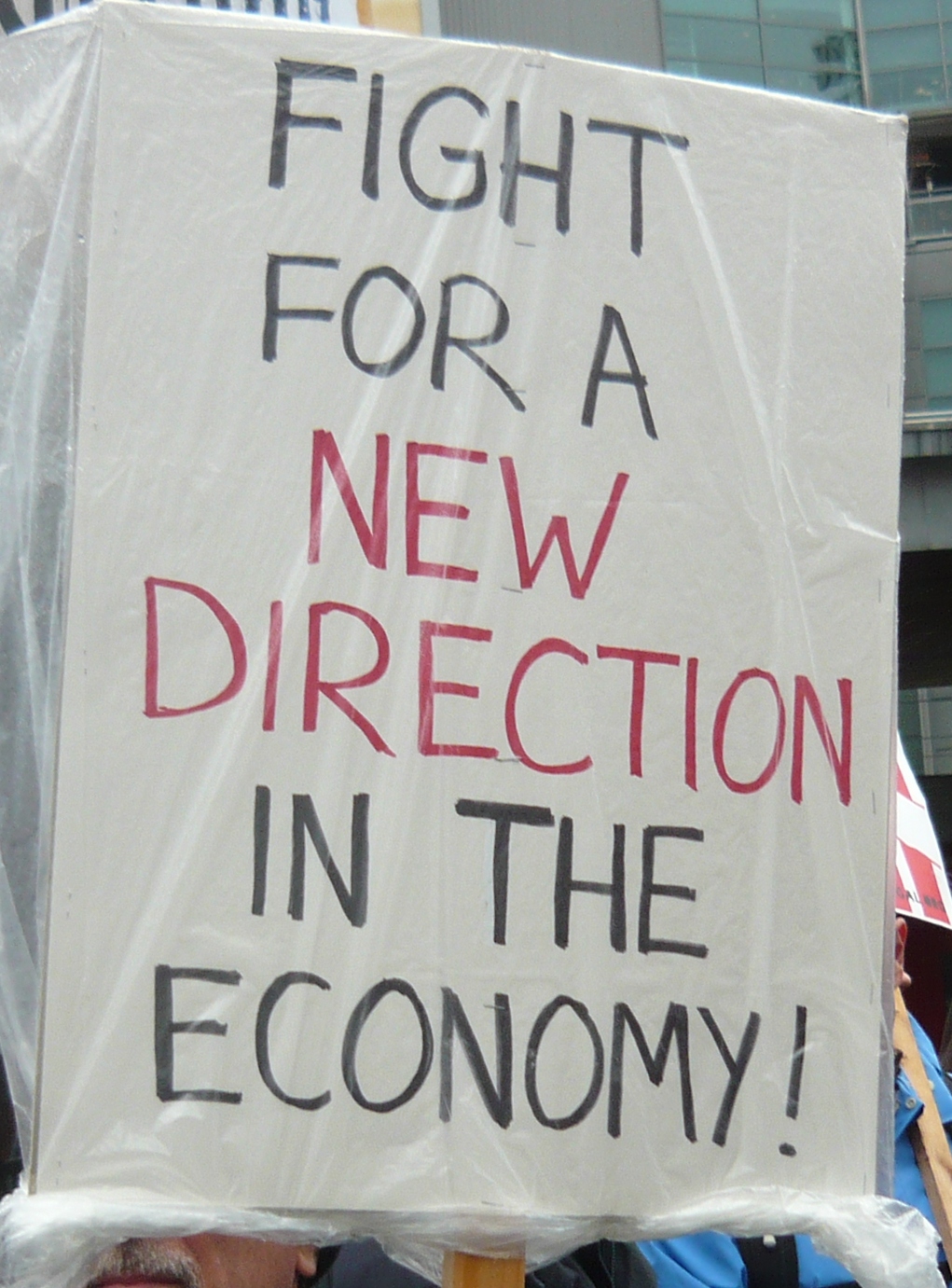 Trudeau and Trump are
promising to decrease
regulations.
Imagine that! Already the rich have become so much richer and, with
regulations, the
poor so much poorer. Imagine what will happen when
even the few that remain are dismantled! The joint statement
says, "The United States and Canada also recognize the importance
of cooperation to promote economic growth, provide benefits to
our consumers and businesses, and advance free and fair trade. We
will continue our dialogue on regulatory issues and pursue shared
regulatory outcomes that are business-friendly, reduce costs and
increase economic efficiency without compromising health, safety,
and environmental standards. We will work together regarding
labor mobility in various economic sectors." Trudeau and Trump are
promising to decrease
regulations.
Imagine that! Already the rich have become so much richer and, with
regulations, the
poor so much poorer. Imagine what will happen when
even the few that remain are dismantled! The joint statement
says, "The United States and Canada also recognize the importance
of cooperation to promote economic growth, provide benefits to
our consumers and businesses, and advance free and fair trade. We
will continue our dialogue on regulatory issues and pursue shared
regulatory outcomes that are business-friendly, reduce costs and
increase economic efficiency without compromising health, safety,
and environmental standards. We will work together regarding
labor mobility in various economic sectors."
The Canadian and U.S. working class and people are
considered
mere consumers, lumped with businesses. It shows that providing
the economy with a new direction is an urgent necessity. Workers
and farmers have a wealth of experience on how common regulations
with no restrictions on borders can destroy entire sectors of the
economy, and threaten farmers and supply management. Workers know
what economic efficiency means and it means utterly sacrificing
their livelihoods and working conditions and resources to further
enrich the oligopolies and create pressure on the entire class.
What does labour mobility mean if not a workforce torn from their
home communities and forced to live an unstable insecure life
going from one huge infrastructure or resource extraction project to
another,
whether in Canada or the U.S., while "undesirables" are sacrificed
on the altar of capital? No right to labour mobility for
them!
[Signed]
***
We workers are not as Trudeau and Trump characterize
us: "At
the end of the day, the President and I share a common goal. We
both want to make sure that hardworking folks can go to work at a
good job, put food on the table for their families, and save up
to take a vacation every once in a while." Trudeau's
condescension is beyond belief! Canadian and U.S. workers are
fighting to exercise control over the economy and all aspects of
their lives. His reward of a "vacation every once in a while"
shows just how frivolous he thinks he can be with the lives of
others.
[Signed]
***
Trump and Trudeau characterized themselves as,
"indispensable
allies in the defence of North America and other parts of the
world through NATO and other multilateral efforts." Under Trudeau
Canada is further tying itself to U.S. strategic interests and
aggressive aims for regime change. Trump raised north Korea as a
big problem, while Trudeau made sure to mention Canada's
participation with the U.S. in the U.S. imperialist aggression
against Korea. The dangers posed to the Canadian and world's
people by continuing the total integration and participation in
the U.S. war machine means stepping up the struggle to get Canada
out of NATO and NORAD and dismantle those aggressive military
alliances. Our security lies in the defence of the rights of all,
not in stepping up the U.S. war preparations.
[Signed]

Canada's Predatory Relations with Mexico
Minister of Natural Resources
Leads Trade Delegation
- Margaret Villamizar -
In the midst of Canada throwing Mexico under the bus in
its relations with the U.S., it is also advancing predatory
relations towards Mexico and facilitating the entry of North
American monopolies into Mexico's newly-privatized energy
sector.
Canada's Minister of Natural Resources, Jim Carr led an
official trade mission to Mexico from January 31 to February 3.
He was accompanied by one of Canada's largest ever trade
delegations comprised of representatives of private mining, oil
and gas, and "clean technology" interests.[1]
According
to Natural
Resources Canada, this was supposed to "advance business
relationships" between Canada and Mexico." In a paternalistic
note Natural Resources Canada said that the Canadian mining and
energy interests -- notorious for corruption, private enrichment,
destruction of the environment and attacks on the rights of the
people -- will "assist Mexico in achieving its goals with respect to
energy reform and socially responsible mineral development."
Natural Resources Canada also stated, "For the first time,
Indigenous representatives will be part of the NRCan
delegation."
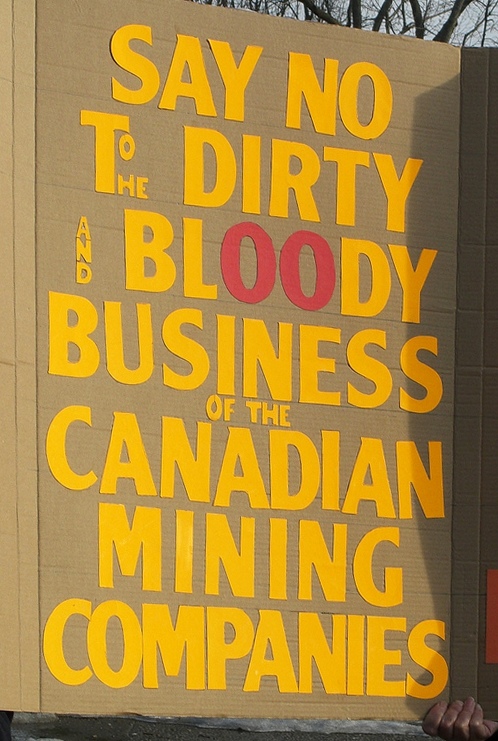 Natural Resources Canada
reported that the visit
created "new
business partnerships that will match Canada's expertise,
technology and resources with Mexico's needs." Carr and Mexico's
Secretary of the Economy, Ildefonso Guajardo, signed a Memorandum
of Understanding (MoU) on "Collaboration in Sustainable Mineral
Resource Development that will benefit both countries over the
coming years by laying the foundation for greater trade, stronger
growth and job creation." Natural Resources Canada
reported that the visit
created "new
business partnerships that will match Canada's expertise,
technology and resources with Mexico's needs." Carr and Mexico's
Secretary of the Economy, Ildefonso Guajardo, signed a Memorandum
of Understanding (MoU) on "Collaboration in Sustainable Mineral
Resource Development that will benefit both countries over the
coming years by laying the foundation for greater trade, stronger
growth and job creation."
The Canadian Electricity Association and
Asociación
Mexicana
de Energía, which both count as members many of the same big
U.S.
and European energy and accounting oligopolies, also signed an MoU
"that will further enhance electricity cooperation between our
two countries." Until 2013, Mexico's energy sector was
constitutionally mandated to be publicly owned and operated. A
constitutional amendment adopted by the government of Enrique
Peña Nieto with support from the U.S. State Department of
Hillary
Clinton opened up the sector to private and foreign investment
and takeover. The result has been severe fuel price hikes and, in
2016, Mexico for the first time became a net importer of oil from
the United States. Another MoU was signed around mining.
Even more obscene was the alleged focus of the trip --
"engagement with local communities and Indigenous peoples." An
example of the kind of engagement with Indigenous peoples
promoted by Canada can be found in the warning of Minister of
Natural Resources Carr in November 2016: "If [protestors
against energy and mining developments] choose ... not to be
peaceful, then the government of Canada, through its defence
forces, through its police forces, will ensure that people will
be kept safe."
According to Mexico's neo-liberal government, the
Canadian
delegation was informed of "new opportunities" for investment in
energy and telecommunications as a result of the opening of the
Mexican constitution and privatization of basic sectors. Mexico's
government reported that Canada agreed "this is a good moment to
strengthen the relationship between Mexico and Canada,
particularly in the mining, energy and telecommunications
sectors." It stated that Minister Carr was "pleasantly surprised,
noting the great interest on the part of Canadian companies in
investing in Mexico's mining and energy sectors."
In an interview published January 12 by
PanamericanWorld,
David
Robillard,
president of the Canadian Chamber of Commerce in Mexico, spoke about
Canadian business involvement in Mexico. He
said relations between Canada and Mexico had grown exponentially over
the last 20 years and that at present it is expected these
investments will multiply in strategic sectors, given the good
climate that exists for this at this time. He pointed out that
Canada is already the main source of foreign investment in
Mexico's mining sector. Robillard said his organization is "very
optimistic" about the energy sector, that Canadian investment in
the sector is "about to increase significantly. ... I don't know
of any other government that has achieved such structural
reforms."
He gave as examples of success, the stories of energy
companies that were part of the government's trade mission.
TransCanada, he said, had investments worth $500 million in Mexico
three years ago while today it has more than $3 billion. Another
company, ATCO just entered the Mexican market and already had won two
projects worth $1.3 billion in electrical generation and transporting
gas, he said. A third company was engaged in exploring oil wells deemed
to be marginal producers and abandoned by the state-owned oil company
Pemex, using technology designed to continue extraction from such
wells, he said. Robillard said around 3,000 Canadian firms operate in
Mexico. Direct investment grew from $500 million in 1992 to $12.6
billion in 2012, the year before the most significant privatization
took place. In 2015 Canadian direct investment in Mexico was more than
$14.8 billion according to Global Affairs Canada. Mexico's Ministry of
the Economy reports that Canada is the country's third largest source
of foreign direct investment after the U.S. and Spain.
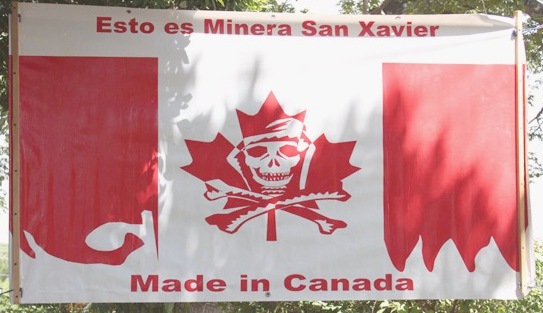 Canadians stand for
relations of mutual respect and
mutual
benefit with Mexico. Predatory relations that covet the resources
and basic sectors of Mexico built by the working class of that
country since it won its independence and later established a
constitution to defend the nation are not acceptable and do not
favour the people of Mexico or Canada. Canada furthermore has
nothing to teach the Mexican people about relations with the
Indigenous peoples of their country. In this regard, delegations
that claim to speak for Canadians or even the Indigenous peoples
of Canada and instead seek the private enrichment of a few and
the plunder of what belongs to the Mexican people by right must
be condemned. Canadians stand for
relations of mutual respect and
mutual
benefit with Mexico. Predatory relations that covet the resources
and basic sectors of Mexico built by the working class of that
country since it won its independence and later established a
constitution to defend the nation are not acceptable and do not
favour the people of Mexico or Canada. Canada furthermore has
nothing to teach the Mexican people about relations with the
Indigenous peoples of their country. In this regard, delegations
that claim to speak for Canadians or even the Indigenous peoples
of Canada and instead seek the private enrichment of a few and
the plunder of what belongs to the Mexican people by right must
be condemned.
Note
1. Delegates according to
Natural Resources Canada:
Provincial Government
Government of Nova Scotia
Indigenous Leaders and
Organizations
First Nations Summit; Métis National Council;
and Canadian
Council
for Aboriginal Business
Regulators
Alberta Energy Regulator; and National Energy Board
Mining Sector
Canadian Association of Mining Equipment and Services
for
Export; Endeavour Silver; First Majestic Silver Corp.; Goldcorp;
Levon Resources; MAG Silver Corp.; Mining Association of Canada;
Primero Mining Co.; Prospectors & Developers Association; Starcore
International Mines Ltd.; and Torex Gold Resources Inc.
Oil and Gas Sector
ATCO Group; Canadian Association of Petroleum Producers;
Clearstone Engineering; Enbridge; Questor Technology;
and TransCanada
Clean Technology /
Renewable Energy Sector
Canadian Electricity Association; Canadian Hydropower
Association; EnerDynamic Systems Inc.; Hydro Québec; Manitoba
Hydro
International; and Northland Power Inc.
Other Participants
National Aboriginal Capital Corporations Association;
New Gold
Inc.; Gran Tierra Energy Inc.; Canadian Solar Inc.; and oneGRID

Mass Protests Against Mexican Government's
Neo-Liberal
Energy Reform
- Claude Brunelle -
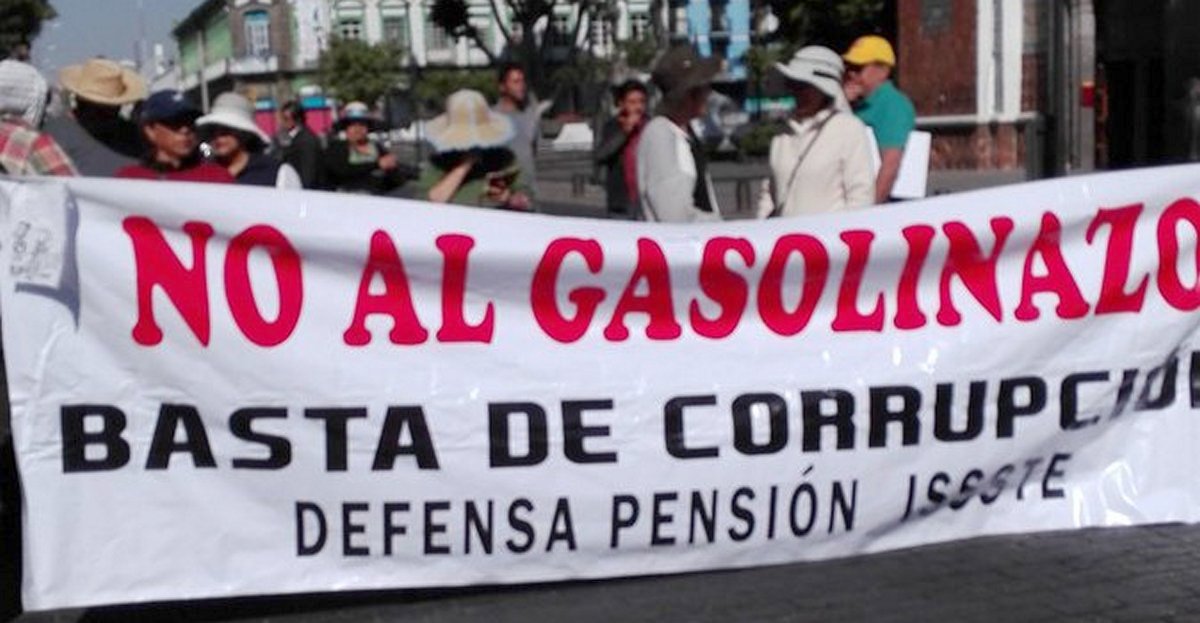
"No to the gas price hike; down with corruption," Mexico City, February
5, 2017.
Since January 1, the Mexican people have been in action
resisting the latest and most drastic increase in the price of gasoline
(el gasolinazo) and other
fuels in the Peña Nieto government's Energy Reform. This is part
of a package of neo-liberal structural reforms called for under a "Pact
for Mexico" signed by the three main parties of the ruling elite soon
after Enrique Peña Nieto assumed the presidency on behalf of the
Institutional Revolutionary Party (PRI) in 2012. Energy Reform was
introduced under the guise of bringing improvements for the people,
including lower fuel prices. It required changing the country's
constitution to open state oil company Pemex to private, including
foreign, investment and removing fuel subsidies so that prices rise to
"market levels." The latter has so far led to a 48 per cent increase in
fuel prices under Peña Nieto, along with higher costs for many
basic goods and services, which are affecting the most vulnerable
particularly hard. Further price hikes are scheduled over the next year.
On February 9, the National Education Workers
Coordinator (CNTE) held a National Day of Action to oppose the
"gasolinazo" and other neoliberal structural reforms imposed by the
Peña Nieto government with the support of other parties of the
ruling elite. Teachers -- whose months-long strike struggle last year
in defence of their rights and of public education was met with brutal
repression -- marched to the National Senate in Mexico City to demand
an end to both the Energy and Education Reforms and delivered boxes
filled with thousands of petitions signed by citizens calling for
public education for all.
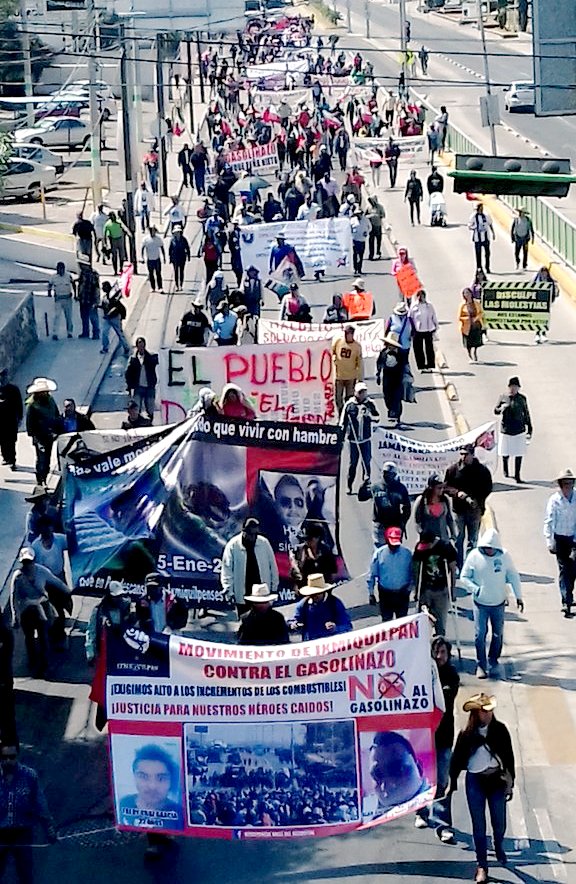 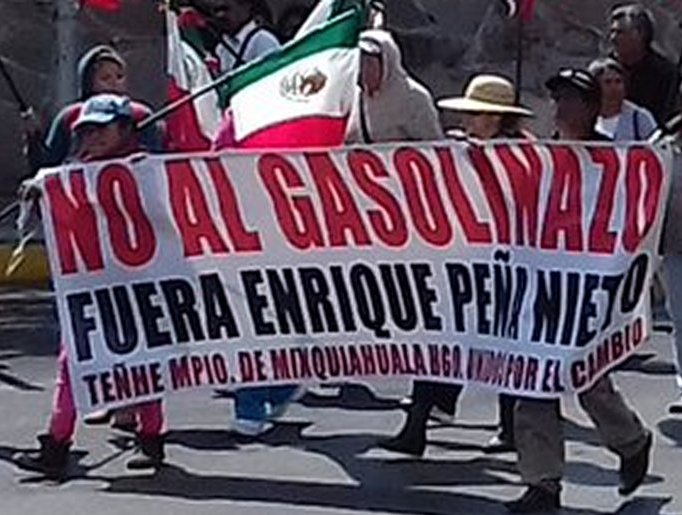
"No to the Gas Price Hike -- Peña Nieto Out," Pachuca, February
5, 2017
Many other similar actions continue to take place
across the country as the people demand a reversal of the anti-social
measures instituted on behalf of the global monopolies competing to
partake in the bonanza created as a result of the opening up of their
basic public services and national assets to privatization and foreign
takeover.
Representatives of the PRI party and others in
opposition, representing sections of Mexico's ruling elite, have been
angrily confronted by the people inside and outside state legislatures,
in the streets and other public places. Roads, service stations and
other Pemex facilities have been blocked and toll booths and customs
checkpoints at northern border crossings occupied. Social media as well
has become a forum for people to express their anger and raise their
demands. In an effort to appease the people's anger, two weekly fuel
price hikes scheduled for February 4 to 17 were postponed by the
government. Pemex CEO José Antonio González Anaya said
the decision to hold off was a result of the improved exchange rate of
the peso against the U.S. dollar and a rise in the international price
of oil, which made it possible to "soften the transition process." He
warned, however, that this could not go on "forever" -- a challenge the
people are sure to respond to and an indication of more battles ahead.
According to reports, many acts of vandalism, looting
and violence widely reported in the monopoly media are part of a
state-organized effort to discredit and criminalize the people's
protest actions as well as create fear. Reports say gang members
have been paid to carry out "smash-and-grabs" and generally
create an atmosphere of anarchy and chaos to justify the killings
and arrests that ensued soon after the protests began.

Tlalpan, February 13, 2017
Another
feature
of
the
protest
actions
in
Mexico
is
that
none
of
the
parties of
the ruling elite have been able to occupy the space opened up by the
profound discontent of the people with the nation-wrecking taking place
in the name of "progress." Despite the attempts of the likes of former
president Vicente Fox, billionaire oligarch Carlos Slim and Peña
Nieto to pose as defenders of the nation with self-serving calls for
unity against Trump, Mexicans are not falling for it. They are
continuing to fight for a reversal of the "gasolinazo," for the
government to come clean about the 2014 disappearance of 43 normal
school students, and to demand "Fuera Peña Nieto!" (Peña
Nieto Out!) in the knowledge that their fight against the attacks of
U.S. imperialism under Trump also requires settling scores with those
who are selling out their country and violating their rights at home.
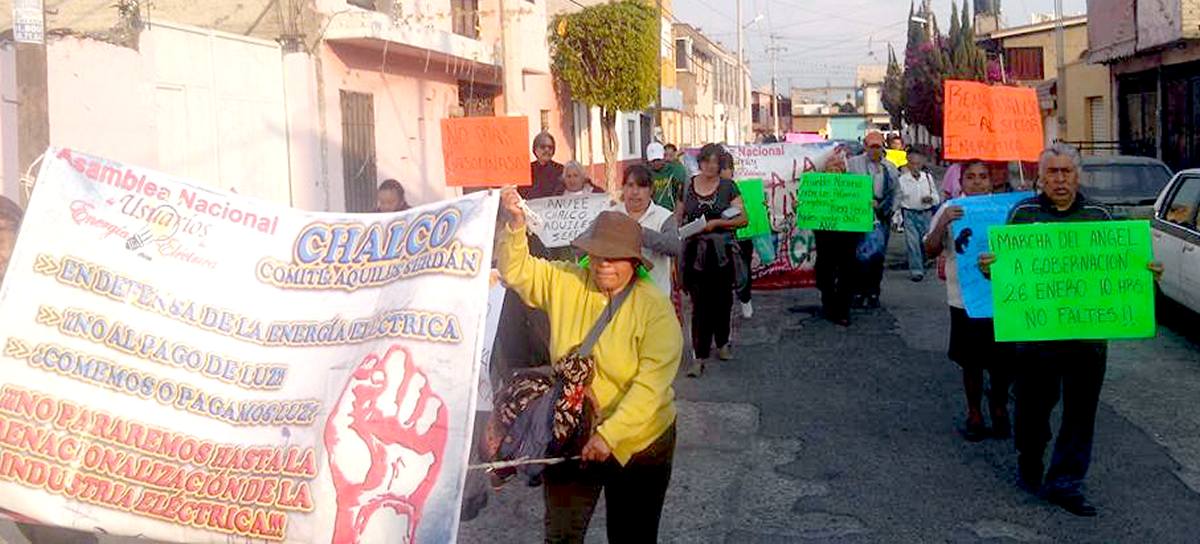
Chalco, February 13, 2017

Chronicle of a Privatization by Stealth
- Crismar Lujano -
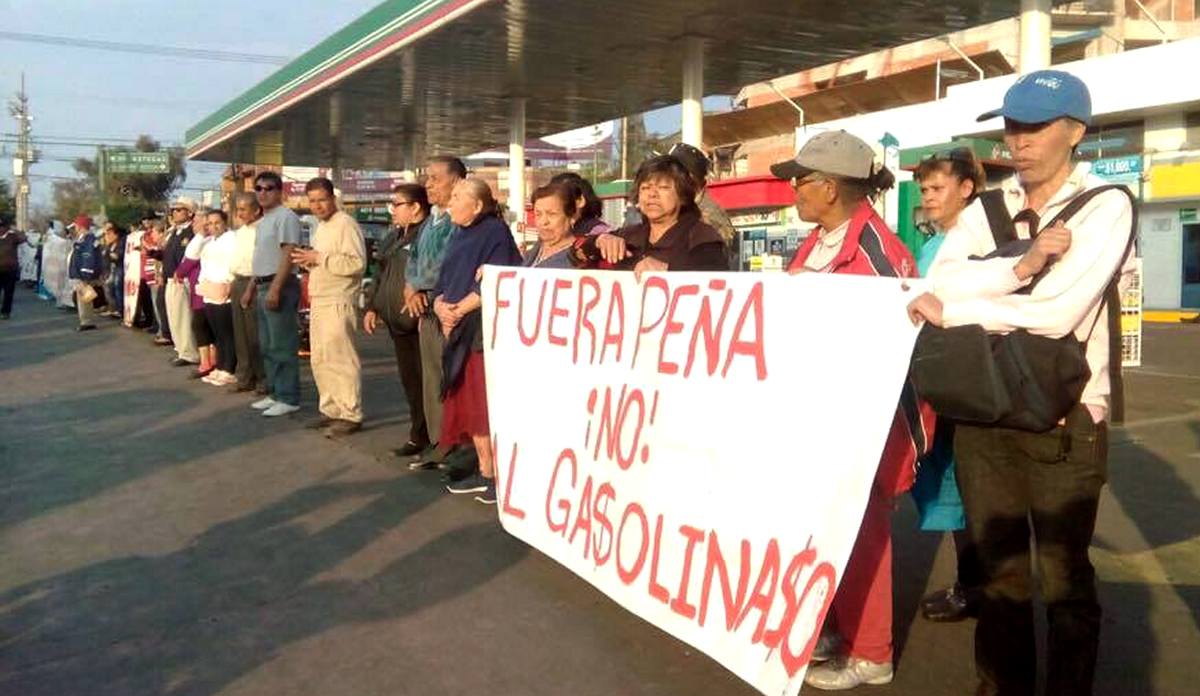
Tlalpan, February 13, 2017
Mexico is starting off a 2017 that many wish would end
now. Along with the twelve strokes that rang in the new year -- or
perhaps [rang out] the old one -- came the biggest fuel price hike in
almost two decades.
The new gasolinazo
[gasoline price hike] that was announced a couple days after Christmas
has generated a wave of popular indignation that in the first week of
protests, mobilizations, takeover of service stations, transportation
strikes and looting left at least six dead, 15 wounded and more than
1,500 detained.
Many economists agree that this represents a big blow
to the pockets of Mexicans. And the multiplier effect of the cost of
gasoline will lead to a predicted three per cent rise in inflation that
will inevitably increase everyone's cost of living, whether they use
vehicles or not.
What are the new prices per litre of fuel?
Magna gasoline increased from 13.98 to 15.99 pesos
(U.S.$0.77),
representing an increase of 14.2 per cent.
Premium went from 14.81 to 17.79 pesos (U.S.$0.85).
This
is the
type of gasoline that underwent the biggest increase, reaching
20.1 per cent.
Finally, diesel increased in price from 14.45 to 17.05
pesos
(U.S.$0.82), which represents an increase of 16.5 per cent.
Looking back, we find this is not the first time the
Mexican
government has increased the price of gasoline.
During the third quarter of 2016 there were three
consecutive increases that, together with others applied since Enrique
Peña Nieto came to power in December 2012, represent a
cumulative increase of 48 per cent.
Things Can Get Worse
"We will go from an environment where we had a single
gasoline, a single price and a single supplier, to a system where
we have greater freedom, more choice, and where prices reflect
the fluctuations in cost, like any other price in the economy,"
insisted José Antonio Meade, Mexico's Secretary of Finance.
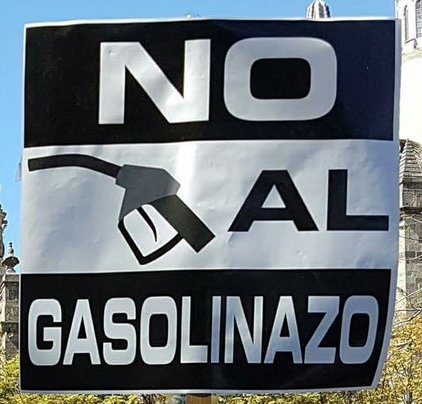 The new system for the sale
of gasoline was not thought
up
overnight. In fact, it is part of a price liberalization plan the
government of President Enrique Peña Nieto intends to use to
have
fuel sold at market prices throughout the country by January
2018. This means that the final price of fuel will reflect at
least five variables: the international price of oil, transport
and storage costs, as well as the cost of refining, each
company's mark-up, taxes (IVA [Value-added tax] and IEPS [Special
excise tax on production and services]) and the exchange rate
between the peso and the U.S. dollar. The new system for the sale
of gasoline was not thought
up
overnight. In fact, it is part of a price liberalization plan the
government of President Enrique Peña Nieto intends to use to
have
fuel sold at market prices throughout the country by January
2018. This means that the final price of fuel will reflect at
least five variables: the international price of oil, transport
and storage costs, as well as the cost of refining, each
company's mark-up, taxes (IVA [Value-added tax] and IEPS [Special
excise tax on production and services]) and the exchange rate
between the peso and the U.S. dollar.
This gives rise to two immediate consequences. Since
there
will not be a single price set by the government, the numbers
will change daily. Nor will there be gas stations belonging
exclusively to the national industry, so new foreign private
companies will also be able to supply the fuel. Do not forget
that we are talking about a country where the sale of gasoline
generates profits of more than U.S.$65 billion annually.
The False Illusion of Energy Reform
On January 4, 2015, President Enrique Peña Nieto
gave his
assurance that thanks to the Energy Reform there would be no more gasolinazos. Today
we know that announcement to be nothing more
than a broken promise, but one with an even darker background
that can be pieced together.
Generally speaking, the energy policy promoted for
decades by
Mexico's different governments laid the foundations for the old
privatization model which involves the transfer of wealth abroad
and the dismantling of the national economy. The handling of the
oil industry, which for years has been at the centre of the
debate, is the clearest example and one of the main reasons for
this reality.
The Energy Reform promulgated in 2014 changed the rules
of
the game and opened up a multi-million dollar business. The
legislation brought forth changes to the constitution in articles
25, 27 and 28 in order to authorize the participation of private
companies, both Mexican and foreign, in the exploration and
exploitation of 17 per cent of the oil fields and the assignment of
rights to 79 per cent of the blocks where there are reserves in Mexican
territory. According to data from the Energy Regulatory
Commission, the prospective hydrocarbon resources of the country,
the world's ninth largest oil producer, are greater than 100
billion barrels. This figure includes proven and possible crude
oil deposits in shallow waters, on land and in deep sea waters,
and also includes natural gas and shale mantles that are
extracted by hydraulic fracking.
The other piece of the pie corresponds to the electric
power business. With the Energy Reform, private capital would also be
licensed to supply large consumers like industries and businesses that
represent more than 50 per cent of the total sales of the Federal
Electricity Commission, and that in 2013 represented revenues of
U.S.$13 billion for Mexico.
As can be seen, the country is emerging as a strategic
supplier of crude oil and other forms of energy to other nations,
but at the cost of national sovereignty.
Privatization by Stealth
The decline in productivity of Petróleos
Mexicanos -- Pemex -- has been used in great part to drive the Energy
Reform.
The main and only state-owned oil company in the
country has
solvency problems. As of 2015, it had losses of U.S.$40 billion and
a debt of almost U.S.$100 billion. Meanwhile, the minimal
reinvestment of earnings in the national industry wasted the
opportunity to use oil as a lever for Mexico's economic
development.
From this crisis it can be seen that under the guise of
cleaning up the accounts, boosting Pemex's industrial
productivity and increasing the sector's competitiveness, the
government of Enrique Peña Nieto is hiding its plans, that are
less and less hidden, to privatize the oil industry.
Beginning in mid-2015, the state-owned oil company
opened up
a bidding process through which U.S. and British companies in the
oil business have been competing with one another to reap the
benefits of joint production contracts for the exploration and
extraction of hydrocarbons. In the Executive's estimation, the
process of opening up to private capital would result in a flood
of foreign investment that would ultimately underpin the
country's economic development -- a strategy that to date has not
reported any success as the flow of investment has been lower
than the government anticipated.
It should be noted that Pemex provides the federal
government
with a third of its annual income, while the income from oil
represents 6.8 per cent of the country's GDP. In other words, the
privatization of the state-owned company will translate into
fewer resources to meet public investment needs and, according to
the logic of the current government, will force a stepping up of
the attacks on social programs, something especially delicate in
the climate of broad popular discontent with EPN's [Enrique Peña
Nieto's] management.
It must not be forgotten that this whole context forms
part of a scenario of deep social breakdown. According to reports by
the National Council for the Evaluation of Mexican Social Development
Policy (CONEVAL), in 2014, of Mexico's 127 million inhabitants, more
than 55 million lived in poverty. In addition, according to a study
done the same year by the World Bank, a third of the country's
population survived on less than five dollars a day.
The cost of this operation, however, is not just
socio-economic; the loss of sovereignty also has a political price.
Undoubtedly, this is a victory for the foreign oil interests and their
allies in Mexico, who have tried to dismantle what is left of the
industry and the country.

Coming Events
Canadian Council for the Americas to Hold Conference in
Toronto
- Louis Lang -
The Canadian Council for the Americas (CCA) is holding
a
conference under the theme "New Strategies for a New North
America" at the Fairmont Royal York Hotel in Toronto on February
21.[1]
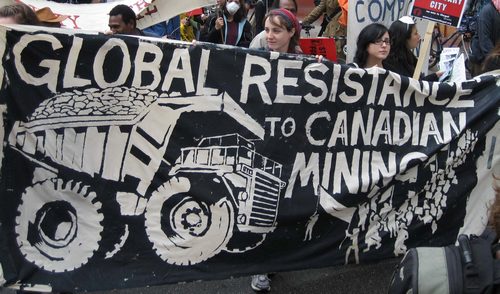 Sponsors include Barrick
Gold, GoldCorp, Kinross,
Lundin
Mining, Scotiabank, Caisse de dépôt et placement du
Québec,
National
Bank, Ontario Teachers' Pension Plan, KPMG, Toronto
Stock Exchange, ATCO, Ellis Don and SNC Lavalin. All have made
superprofits for many years by exploiting the natural resources
and labour of the people of the Americas and the goal of this
conference is to ensure that these activities continue. Sponsors include Barrick
Gold, GoldCorp, Kinross,
Lundin
Mining, Scotiabank, Caisse de dépôt et placement du
Québec,
National
Bank, Ontario Teachers' Pension Plan, KPMG, Toronto
Stock Exchange, ATCO, Ellis Don and SNC Lavalin. All have made
superprofits for many years by exploiting the natural resources
and labour of the people of the Americas and the goal of this
conference is to ensure that these activities continue.
The topic of the conference suggests that the members
of the
CCA (investment, mining, construction, energy and other corporate
interests) are concerned about the new situation they are facing
in the hemisphere with the election of Donald Trump. What is new
is that the Trump administration is taking measures to dismantle
or reorganize the structures created through neo-liberal globalization
for the
past five decades. This upheaval endangers the economic prospects
for the oligopolies which have dominated North, Central and South
America and the Caribbean to the present day.
One of the main speakers at the conference is former
Prime
Minister Brian Mulroney, whose government negotiated the Free
Trade Agreement with the U.S. Government during the Reagan
administration. This was later expanded to include Mexico in the
North American Free Trade Agreement.
At this time, Brian Mulroney is being promoted as one
whose counsel is so valuable to Justin Trudeau, not only because
he favours free trade, but because he has very close ties to
President Trump and some important members of his administration.
In fact the political elite in Canada has been crediting Brian
Mulroney for his "work behind the scenes," during the
preparations for Trudeau's visit to Washington.
The Montreal daily La Presse carried an article
titled
"Preparing the Ground for Trudeau," which quoted the following
from Jean Charest, past Premier of Quebec: "The Trudeau
Government could not have picked a better person than Brian
Mulroney to help establish good relations. He knows Mr. Trump
very well and also many members of his administration."
Such hollow praise of Mulroney can have no other goal
than to
create confusion about the present situation and the problem
faced by the vast majority of Canadians. The discussion organized
by the CCA will not find solutions to any economic or political
problems with its narrow outlook of trying to find new
opportunities for the oligopolies, within this situation, to
continue exploiting the people in the hemisphere. The CCA refuses
to recognize that the neo-liberal policies of globalization and
what they call free trade is in deep crisis and trying to
revitalize it will fail.
 The Canadian people will
not be fooled into taking
sides in
this conflict because both sides are wrong. The dangers posed by
the Trump policies of waging economic and political wars to
impose the domination of U.S. imperialism are doomed to fail as
well. The Canadian people will
not be fooled into taking
sides in
this conflict because both sides are wrong. The dangers posed by
the Trump policies of waging economic and political wars to
impose the domination of U.S. imperialism are doomed to fail as
well.
As for Mulroney, working people will never forget or
forgive
his actions. The arrangements put in place with the imposition of
free trade have not brought prosperity for the vast majority of
Canadians. Far from it, the rich are getting richer and the poor
are being pushed into further poverty at an unprecedented rate.
There has been no growth in the manufacturing sector either,
without which there can be no balanced economy. Instead the trend
towards ripping and shipping energy and other natural
resources has increased, resulting in a jobless recovery.
It is not a coincidence that with the advent of free
trade,
governments at all levels imposed austerity measures that cut
health care and all social programs, forcing the most vulnerable
sections of society to fend for themselves. Workers' wages and
security in both the private and public sector have been
continually under attack and past agreements guaranteeing
pensions and benefits to retired workers are being ripped up.
Free trade agreements, under the guise of eliminating
red
tape, have allowed corporations to dictate to governments what
regulations to eliminate because they interfere with
profits. Environmental regulations, labour laws, among many other
types of regulations, have been under constant attack. Meanwhile
privatization and deregulation of public services and assets have
been imposed, because under NAFTA corporations are able to sue
governments for any measures that limit their ability to make profits.
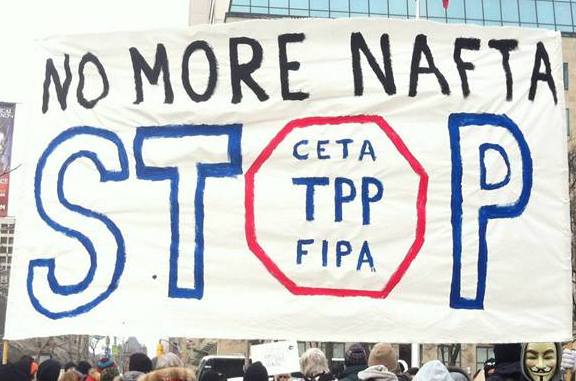 This is the legacy of
Mulroney, Chrétien, Martin,
Harper and
now Trudeau, who want to fool the gullible into backing a system
which has created such disasters for the people and society and
is now facing a crisis from which there is no recovery. This is the legacy of
Mulroney, Chrétien, Martin,
Harper and
now Trudeau, who want to fool the gullible into backing a system
which has created such disasters for the people and society and
is now facing a crisis from which there is no recovery.
Trudeau and Mulroney and their cohorts should be
ashamed of
themselves for suggesting to the Canadian people that we should
rely on Wilbur Ross and Stephen Schwarzman or any other
super-rich vulture to curry favour with Donald Trump. That such
a plan is seriously being put forward indicates the severe and
desperate crisis facing the ruling elite.
The real solution lies in providing a modern
definition for
democracy where people exercise control and establish an economy
that serves them and society, and foreign relations on
the basis of sovereignty and mutual respect instead of economic,
political and military domination, which always leads to war.
Note
1. Speakers at the conference
announced so far include:
- Brian Mulroney, Former Prime
Minister, Canada
- Chrystia Freeland, Minister of Foreign
Affairs, Canada
- Luis Videgaray, Minister of Foreign Affairs,
Mexico
- Ildefonso Guajardo, Minister of the Economy, Mexico
-
Kimberley Breier, Deputy Director Americas Program, Center for
Strategic and International Studies; Director, North America,
National Security Council in the administration of George W.
Bush.
The website of the CCA
describes the organization as "the premier forum for discussion
of political and economic issues in the hemisphere that are
critical for Canadian trade and investment." The CCA promotes
membership in the organization by providing "direct access to
high level private and public sector representatives from
Canada," and also offers "valuable contacts" to its members. The
Board of Directors of CCA is made up of representatives from the
corporations and financial institutions listed above.

PREVIOUS
ISSUES | HOME
Website: www.cpcml.ca
Email: editor@cpcml.ca
|




 Missing from the mass media
was any political discussion that
should be front and centre such as what Canada has to do to
affirm its sovereignty in the face of U.S. imperialism's drive
for world hegemony and the increasing danger of war. The
oligarchs in control of the economy have made it clear that they
want Canada to be a captive source of natural resources for U.S.
imperialism. Is this the direction that will bring prosperity and
security to Canadians? The imposition of false ideological
beliefs diverts people from investigating and discussing what
kind of economy does Canada need when faced with a trading
partner in the U.S. that is so domineering and unreliable. What
new direction for the economy is necessary to make it secure and
able to stand on its own without having to rely on exports of
natural resources as it does today, which makes it vulnerable to
every crisis the U.S. imperialists create?
Missing from the mass media
was any political discussion that
should be front and centre such as what Canada has to do to
affirm its sovereignty in the face of U.S. imperialism's drive
for world hegemony and the increasing danger of war. The
oligarchs in control of the economy have made it clear that they
want Canada to be a captive source of natural resources for U.S.
imperialism. Is this the direction that will bring prosperity and
security to Canadians? The imposition of false ideological
beliefs diverts people from investigating and discussing what
kind of economy does Canada need when faced with a trading
partner in the U.S. that is so domineering and unreliable. What
new direction for the economy is necessary to make it secure and
able to stand on its own without having to rely on exports of
natural resources as it does today, which makes it vulnerable to
every crisis the U.S. imperialists create?


 The workers of Canada,
Mexico and the U.S. are together
the
targets of all the attacks of the Trump administration and of the
oligopolies which consider all three countries as territory for
building their empires. Through arrangements such as NAFTA they
have given themselves free rein to force the workers into
competition on a continent-wide scale to bring down wages and
working conditions for all, and to close and reopen factories
according to what will serve their empire-building.
The workers of Canada,
Mexico and the U.S. are together
the
targets of all the attacks of the Trump administration and of the
oligopolies which consider all three countries as territory for
building their empires. Through arrangements such as NAFTA they
have given themselves free rein to force the workers into
competition on a continent-wide scale to bring down wages and
working conditions for all, and to close and reopen factories
according to what will serve their empire-building. Media has focussed most
attention on the statement of
Trump
during the joint press conference that "We have a very
outstanding trade relationship with Canada. We'll be tweaking it.
We'll be doing certain things that are going to benefit both of
our countries. It's a much less severe situation than what's
taking place on the southern border. On the southern border, for
many, many years, the transaction was not fair to the United
States. It was an extremely unfair transaction. We're going to
work with Mexico, we're going to make it a fair deal for both
parties. I think that we're going to get along very well with
Mexico; they understand and we understand."
Media has focussed most
attention on the statement of
Trump
during the joint press conference that "We have a very
outstanding trade relationship with Canada. We'll be tweaking it.
We'll be doing certain things that are going to benefit both of
our countries. It's a much less severe situation than what's
taking place on the southern border. On the southern border, for
many, many years, the transaction was not fair to the United
States. It was an extremely unfair transaction. We're going to
work with Mexico, we're going to make it a fair deal for both
parties. I think that we're going to get along very well with
Mexico; they understand and we understand." Despite the vagueness of the
statement, the direction
is for
Canada to come further under U.S. military command. It likely
includes the placement of new generations of U.S.-controlled
NORAD sensors on Canadian territory through which the movement of
people and goods can be monitored. It also relates to the plans
of Canada's ruling circles to present the placement of U.S.
missiles and sensors in Canada as part of the U.S. ballistic
missile defence program as necessary, including creating hysteria
around attacks against Canadian cities.
Despite the vagueness of the
statement, the direction
is for
Canada to come further under U.S. military command. It likely
includes the placement of new generations of U.S.-controlled
NORAD sensors on Canadian territory through which the movement of
people and goods can be monitored. It also relates to the plans
of Canada's ruling circles to present the placement of U.S.
missiles and sensors in Canada as part of the U.S. ballistic
missile defence program as necessary, including creating hysteria
around attacks against Canadian cities. The U.S. also says it
"welcomes" Canada's decision to
buy 18 new
Super Hornet aircraft as an interim measure "until the permanent
replacement [for the CF-18] is ready."
The U.S. also says it
"welcomes" Canada's decision to
buy 18 new
Super Hornet aircraft as an interim measure "until the permanent
replacement [for the CF-18] is ready." Trudeau's reference to
Winston Churchill in his press
conference with Donald Trump on February 13 well reveals his
service to private interests and national sellout as well as
adherence to brutal ways to defend Anglo-American values and "way
of life."
Trudeau's reference to
Winston Churchill in his press
conference with Donald Trump on February 13 well reveals his
service to private interests and national sellout as well as
adherence to brutal ways to defend Anglo-American values and "way
of life." Natural Resources Canada
reported that the visit
created "new
business partnerships that will match Canada's expertise,
technology and resources with Mexico's needs." Carr and Mexico's
Secretary of the Economy, Ildefonso Guajardo, signed a Memorandum
of Understanding (MoU) on "Collaboration in Sustainable Mineral
Resource Development that will benefit both countries over the
coming years by laying the foundation for greater trade, stronger
growth and job creation."
Natural Resources Canada
reported that the visit
created "new
business partnerships that will match Canada's expertise,
technology and resources with Mexico's needs." Carr and Mexico's
Secretary of the Economy, Ildefonso Guajardo, signed a Memorandum
of Understanding (MoU) on "Collaboration in Sustainable Mineral
Resource Development that will benefit both countries over the
coming years by laying the foundation for greater trade, stronger
growth and job creation." Canadians stand for
relations of mutual respect and
mutual
benefit with Mexico. Predatory relations that covet the resources
and basic sectors of Mexico built by the working class of that
country since it won its independence and later established a
constitution to defend the nation are not acceptable and do not
favour the people of Mexico or Canada. Canada furthermore has
nothing to teach the Mexican people about relations with the
Indigenous peoples of their country. In this regard, delegations
that claim to speak for Canadians or even the Indigenous peoples
of Canada and instead seek the private enrichment of a few and
the plunder of what belongs to the Mexican people by right must
be condemned.
Canadians stand for
relations of mutual respect and
mutual
benefit with Mexico. Predatory relations that covet the resources
and basic sectors of Mexico built by the working class of that
country since it won its independence and later established a
constitution to defend the nation are not acceptable and do not
favour the people of Mexico or Canada. Canada furthermore has
nothing to teach the Mexican people about relations with the
Indigenous peoples of their country. In this regard, delegations
that claim to speak for Canadians or even the Indigenous peoples
of Canada and instead seek the private enrichment of a few and
the plunder of what belongs to the Mexican people by right must
be condemned.





 The new system for the sale
of gasoline was not thought
up
overnight. In fact, it is part of a price liberalization plan the
government of President Enrique Peña Nieto intends to use to
have
fuel sold at market prices throughout the country by January
2018. This means that the final price of fuel will reflect at
least five variables: the international price of oil, transport
and storage costs, as well as the cost of refining, each
company's mark-up, taxes (IVA [Value-added tax] and IEPS [Special
excise tax on production and services]) and the exchange rate
between the peso and the U.S. dollar.
The new system for the sale
of gasoline was not thought
up
overnight. In fact, it is part of a price liberalization plan the
government of President Enrique Peña Nieto intends to use to
have
fuel sold at market prices throughout the country by January
2018. This means that the final price of fuel will reflect at
least five variables: the international price of oil, transport
and storage costs, as well as the cost of refining, each
company's mark-up, taxes (IVA [Value-added tax] and IEPS [Special
excise tax on production and services]) and the exchange rate
between the peso and the U.S. dollar. Sponsors include Barrick
Gold, GoldCorp, Kinross,
Lundin
Mining, Scotiabank, Caisse de dépôt et placement du
Québec,
National
Bank, Ontario Teachers' Pension Plan, KPMG, Toronto
Stock Exchange, ATCO, Ellis Don and SNC Lavalin. All have made
superprofits for many years by exploiting the natural resources
and labour of the people of the Americas and the goal of this
conference is to ensure that these activities continue.
Sponsors include Barrick
Gold, GoldCorp, Kinross,
Lundin
Mining, Scotiabank, Caisse de dépôt et placement du
Québec,
National
Bank, Ontario Teachers' Pension Plan, KPMG, Toronto
Stock Exchange, ATCO, Ellis Don and SNC Lavalin. All have made
superprofits for many years by exploiting the natural resources
and labour of the people of the Americas and the goal of this
conference is to ensure that these activities continue. The Canadian people will
not be fooled into taking
sides in
this conflict because both sides are wrong. The dangers posed by
the Trump policies of waging economic and political wars to
impose the domination of U.S. imperialism are doomed to fail as
well.
The Canadian people will
not be fooled into taking
sides in
this conflict because both sides are wrong. The dangers posed by
the Trump policies of waging economic and political wars to
impose the domination of U.S. imperialism are doomed to fail as
well. This is the legacy of
Mulroney, Chrétien, Martin,
Harper and
now Trudeau, who want to fool the gullible into backing a system
which has created such disasters for the people and society and
is now facing a crisis from which there is no recovery.
This is the legacy of
Mulroney, Chrétien, Martin,
Harper and
now Trudeau, who want to fool the gullible into backing a system
which has created such disasters for the people and society and
is now facing a crisis from which there is no recovery.